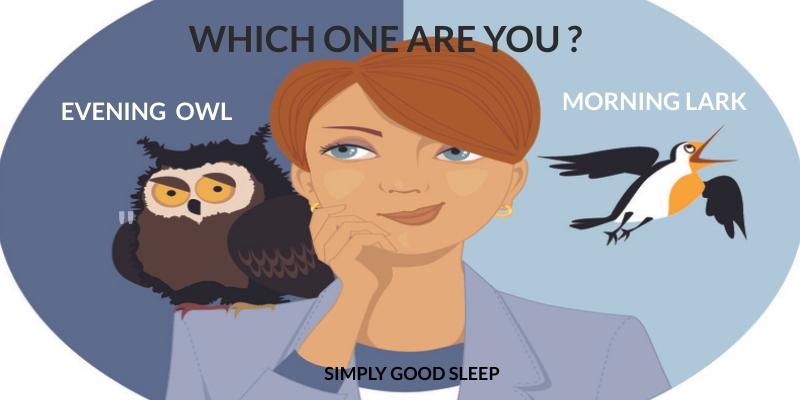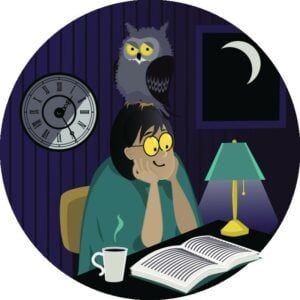
Are you a morning lark or are you an evening owl? Read on to find out which one you are and how being either a morning lark or an evening owl can affect your sleep.
Some people are morning people and others are night owls. Whichever you are, there is one thing we all have in common; we’re all at the mercy of our internal “body clock”. Body clocks, which regulate the circadian rhythm, are found in just about every cell in our body. They control how awake or tired we feel across 24 hours.
The circadian rhythm is controlled by the suprachiasmatic nucleus in the brain, which is responsible for detecting light. When your body registers that it is dark outside signals are sent to this nucleus. This suprachiasmatic nucleus then causes the pineal gland, another structure found in your brain, to produce melatonin, the hormone that leaves you feeling drowsy and tired.
Sleep Chronotypes
Another important factor that determines how your biological clocks affect your sleep behaviors is your chronotype.
Early birds – also known as “morning larks” – wake up bright and early and are very active in the morning. They start to get tired in the afternoon and very tired by evening. Then there is the late chronotype – better known as “night owls” or “evening owls” who are tired in the morning but are more active later in the day.
Different chronotypes can affect when melatonin is released. For the morning lark, melatonin release peaks at around 6 pm so that they are tired by around 9 pm. With a night owl, melatonin levels could peak at around 10 pm, if not later, so they never get tired to go to bed until around 2 am in the morning.
Around 40% of all people are “morning people”. They wake up early and have a lot of “get up and go”. It’s all good until the evening hits and they start to glaze over before just shutting down.
Around 30% of people aren’t morning people by any means. This is the percentage of night owls who hate getting out of bed in the morning and love staying up all night. They’ll have trouble sleeping “early” even if they are actually tired because their body hasn’t released much – if any – melatonin.
The remaining 30% of people are somewhere between lark and owl.
About Night Owls
Night owls have a lot of trouble getting to sleep early at night. It can even be impossible for them to sleep before the early  hours of the morning. That means that, naturally, they also wake up later in the morning.
hours of the morning. That means that, naturally, they also wake up later in the morning.
This is a problem because most jobs – and certainly schools – don’t take that kind of natural behavior into account. Almost everyone is trying to make themselves be a lark and fit into what is accepted by society.
Night owls are unable to function properly in the morning but they can’t be blamed for that. It’s a genetic predisposition that they can’t help. They are “awake”, sure, but their brain is basically in a “sleep-like” state until their sleep-wake cycle catches up to them and they properly wake up and start functioning normally. As you’d expect, night owls are at their best during the evening. It’s when they are at their most productive and get their best work done.
It’s all too common for morning people to assume that night owls are lazy because they don’t wake up early and have the same energy in the morning as others.

About Morning Larks
Morning larks are so good in the morning that they don’t even need alarms to wake them up. They just get up naturally relatively early and have no problem getting right on with their day. They are at their most productive early on when their brain is firing on all cylinders. Their productivity and energy start to dip in the late afternoon and really hit their trough in the evening.
The Role Chronotype Plays on Sleep Deprivation
Our modern society is built around the idea that we are all morning people. It’s hardly surprising that night owls are more likely to be sleep deprived. They’ve got to wake up at the same time as larks but they aren’t able to get to sleep earlier in order to compensate for that fact. They just have to deal with having less sleep.
With that said, it doesn’t mean that larks are immune to sleep deprivation. They can still suffer from it too. The difference is that larks become sleep deprived depending on what they do in the evening. If they sleep when they feel that they have to then they generally get enough sleep and don’t have to worry about sleep deprivation. If they stay up too late browsing the internet or watching TV, they can become sleep deprived.
While it’s possible for both morning and night people to become sleep deprived, it feels like more of a choice for morning people with how society is structured. No matter what the cause though, sleep deprivation should never be ignored. It’s a serious issue that can cause mental and physical problems.
Final Words
Whether you are a morning lark or an evening owl, make sure you listen to your body, practise good sleep hygiene, and get the right amount of good sleep when you need it!

2 Responses
I’m an evening owl for sure! The chronotype thing makes complete sense, I don’t feel so much like a “reject” anymore since I like getting up at 12pm and going to sleep at 2:30am. I’ve gotten a lot of crap from people over the years about my sleep cycle but it’s what works for me. Thank you for spreading the word that there are two different types of sleeping habits for people and that the “late risers” aka owls aren’t always “lazy” they are just on a different melatonin cycle.
It is totally okay to be a night owl. In our experience, it’s much healthier and effective to work with your body, not against it. If you’re not a morning person, don’t force yourself to be one. Try to find your optimal sleep and wake times and stick to them. Consistently regular sleep is important.